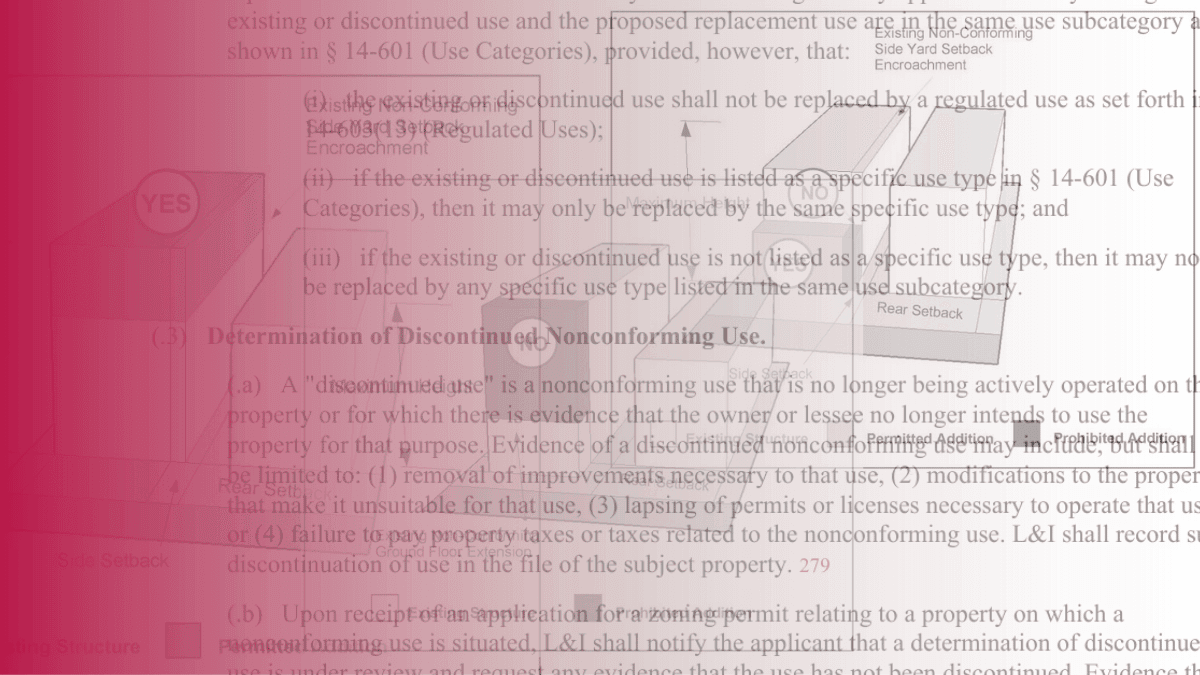At the beginning of 2025, we told passionate, dedicated readers of the Permit Philly blog (we assume there are millions of you) that the City of Philadelphia was going to crack down on grandfathered zoning. Saying a property is “grandfathered in” isn’t a technical or legal term, but it does basically describe situations where the size or use of an old building doesn’t meet current zoning rules, yet the building is allowed to remain as it is (this isn’t an option for every old building – contact us if you have questions about a particular property). We explained how Bill 2024042700 sought to “discourage and eventually eliminate non-conforming [meaning, grandfathered] uses and structures City of Philadelphia because they are detrimental to the orderly development of the City,” and that the bill looked certain to pass City Council in early 2025.
Well, almost immediately after that, things got a little spicy!
The Campaign Against Grandfathered Zoning
First, in February 2025 the bill’s author – 5th District Council Member Jeffery Young – amended it, following considerable pushback to the first draft. We explained the first version this way:
[T]he bill basically says that any time someone stops using a “nonconforming” building, or gets a permit to change its shape or use, the building is subject to current zoning and building codes. This is kind of how it already goes, but this code change would likely lead to (1) new Licenses and Inspections guidelines making it harder to maintain old uses, and (2) harsher interpretation of edge cases. Meaning: when it’s kind of hard to decide which parts of the Philly Code should apply, or the paper trail is a little vague, City Council is telling L&I to always choose to eliminate the old, grandfathered use.
The February revision softened this approach slightly: instead of directing L&I to always eliminate grandfathered uses and demand grandfathered buildings meet current zoning rules, L&I should only enforce those rules when there’s no zoning permit on record for the grandfathered building.
Because the revision language was still pretty broad, the result would likely have been a lot of confusion about what was legal and what wasn’t. L&I would have needed to come up with some rubric to figure out when to demand permits or variances for existing structures, based on when L&I believed a structure’s zoning changed without proper permits. Difficult, confusing, and a lot of extra work.
Most of City Council apparently agreed, because the second thing that happened (back in March) was that the amended bill passed, but only by exempting 7 of 10 council districts from the rules: a large, confusing change for grandfathered zoning that only would apply to three districts in all of Philadelphia. Two council members even voted against it, which is extremely rare for zoning bills because of Philly’s tradition (not a law!) of “councilmanic prerogative.” (That’s a whole other discussion; see here if you’re curious.)
So as we predicted, the bill passed and Council’s War on the Grandfather(ed building) was declared, albeit in only three districts. Except that the mayor still had to sign the bill to make it law, and Mayor Parker was not interested in doing that.
As the Philadelphia Inquirer reported, Young’s entire crusade against grandfathered zoning was really an attempt to stop a former nursing home in his district from providing services to addicts. Philly already prohibits safe injection sites in nearly all areas of the city, but Young was determined to prevent this facility from providing “triage and wellness” services to homeless drug users (to be clear, this was a concern of many of his constituents). Because the facility used to be a nursing home, he or his office apparently determined grandfathered zoning was legal cover for the change they wished to stop.
And boy did they try to stop it! Council Member Young introduced “legislation that [sought] to effectively block [the mayor’s office] from operating [the] addiction services facility” in that former nursing home. He also threatened to subpoena Mayor Parker herself. Finally, he introduced all these versions of legislation to eliminate or at least restrict grandfathered zoning in Philadelphia.
In the end, however, Mayor Parker still holds veto power, and the threat of a veto – and her apparently strong enough pull with City Council – compelled Council Member Young to finally concede defeat in April 2025 – at least for now.
Grandfathered Zoning Survives! … So What Does That Mean?
With storytime over, you might think grandfathered zoning is gifted to all old buildings in Philadelphia!
But it’s not that simple – in fact, one of the weird things about Council Member Young’s proposed bill was that it would complicate an issue that’s already plenty complicated. As we said the first time around:
At Permit Philly, clients and leads ask all the time about “grandfathered” uses: they’ll say an old building has been a clothing store for decades, so of course that store is grandfathered in by the code… right? That triplex has been there since the 40s – surely it’s grandfathered in!
The answer is everyone’s favorite: it depends. (The people go nuts for that answer. A real crowd-pleaser.)
It depends on the circumstances and documented history, mostly, because there’s no general rule out there – in practice or in the Philadelphia Code – that you can just use the building the way it’s always been used without specific proof of that use. You can’t necessarily even keep the size of a building, if you’re trying to renovate an old structure in a way subject to current zoning rules.
It’s very tough to figure out when a building’s zoning is – or can be – grandfathered in. Which is why we here at Permit Philly figure it out for you: we offer consultations to determine if you can grandfather zoning or not. When you can, we get the permits you need – in the right order – to legally document the grandfathered zoning and lock it in place as long as maintained.
And to get the answer about your property, all you have to do is get in touch.

